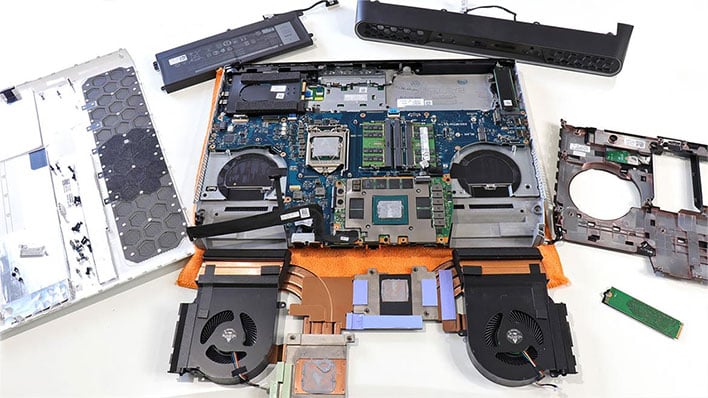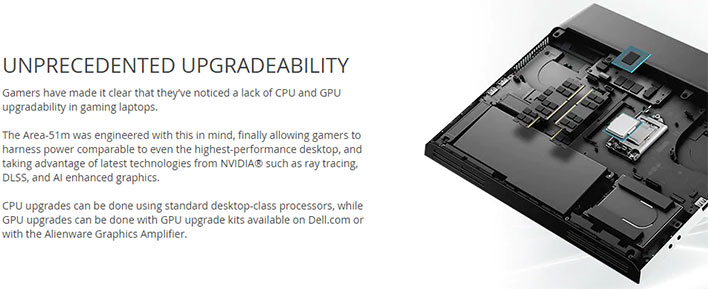Dell Slapped With Class Action Suit Alleging Fraudulent Alienware Area-51m Upgrade Claims
A class-action lawsuit has been filed against Dell over its Alienware Area-51m laptop and the limited upgrade path available to consumers. According to the lawsuit, Dell "intentionally misled and deceived" customers into thinking there would be more robust upgrade options for what had been its flagship gaming laptop at the time of its release.
It is a somewhat unique case, and definitely an interesting one. For the most part, laptops at best only allow for relatively minor do-it-yourself upgrades, like adding more RAM or storage, or swapping out the wireless card. But even those parts are sometimes off limits, let alone core components like the CPU and GPU, which can rarely be upgraded (there are occasional exceptions, often called whitebooks).
The Alienware Area-51m was touted as one of those exceptions with modular GeForce RTX graphics. Dell advertised "unprecedented upgradeability" for that laptop, saying users could swap out the CPU using standard desktop-class processors, and that there would be GPU upgrade kits available as well.
"Gamers have made it clear that they’ve noticed a lack of CPU and GPU upgradability in gaming laptops.
The Area-51m was engineered with this in mind, finally allowing gamers to harness power comparable to even the highest-performance desktop, and taking advantage of latest technologies from NVIDIA such as ray tracing, DLSS, and AI enhanced graphics," Dell stated on the laptop's product page.
In our Alienware Area-51m review, we pointed out that diving deep into the belly of the beast to make those upgrades might be intimidating for novice users, but it's not overly complex either. We also pointed out that our configuration was on the higher end, which could limit the upgrade path, depending on how well Dell supported the machine moving forward, as new sockets and interface-compatible chip architectures evolve.
Therein lies the crux of the class-action lawsuit against Dell . It essentially claims Dell did not support future upgrades long enough, saying that the Area-51m R1 was released in the summer of 2019 with support for Intel's 9th Gen Core processors, around a year before Intel launched its 10th Gen Core chips.
According to the lawsuit, Dell works closely with Intel and NVIDIA and therefore either knew or should have known that upcoming CPU and GPU launches would hamper the laptop's upgrade path.
"Dell released the Area-51m R1 near the end of the life cycle of its CPU and GPU. As such, Dell knew it had to address consumers' hesitation to purchase the Area-51m R1 shortly before its core components became outdated. To that end, Dell represented that the Area-51m's core components were upgradeable, thereby addressing any hesitation or apprehension consumers had regarding its soon-to-be outdated core components," the lawsuit states.
"In reality, the Area-51m R1's core components were not upgradeable. Dell has admitted that. Dell falsely told consumers that the Area-51m R1's core components were upgradable to motivate buyers unwilling to purchase a gaming laptop near the end of its core components' generational life cycle to create a significant (though false) competitive advantage against other gaming laptop manufacturers, as no other company offered a laptop with such capability at the time the Area-51m R1 went on sale," the lawsuit continues.
We're not sure how successful this lawsuit will ultimately be. For one, Dell actually announced the Area-51m at CES in January of 2019, and we reviewed it in April—that's to say, it did not launch in the summer as the lawsuit claims, but several months earlier. Additionally, the issue seems to come down to whether there is an expectation that an upgrade path exists from one generation of hardware to the next. Certainly users who opted for a lower end config could upgrade to a faster CPU and GPU, as advertised.
To that end, Dell launched a refreshed model in 2020 (Area-51m R2) that added support for Intel's 10th Gen Core CPUs and more GPUs. But as far as the lawsuit is concerned, the R1 variant "supposedly was upgradeable to later generation Intel CPUs and NVIDIA GPUs," only it did not end up being that way, leaving consumers having to "pay a significant premium to obtain a computer using" the newer CPU and GPU hardware.
The lawsuit seeks unspecified damages, attorney fees, and an option for Area-51m R1 owners to return their laptops.



